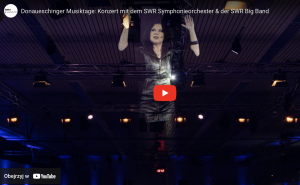Outside the Realm of Time
Instrumentation: 3333 – 3431 – Timp. +3 perc – pn hp – strings

Na zewnątrz Czasu
Outside the Realm of Time
Człowiek wyobraża sobie przyszłość jako refleks teraźniejszości rzutowanej w pustą przestrzeń, gdy ona jest wynikiem – często bardzo bliskim – przyczyn, przeważnie dla nas nieuchwytnych.
We picture the future as a reflexion of the present projected into empty space, whereas it is the result, often almost immediate, of causes which for the most part escape our notice.
1.
Ludzka istota jest bowiem zależna od pamięci.
Mgnienie obrazu niezmiennie istnieje i żyje, a wraz z nim żyje człowiek, którego postać powieliły odbicia.
It is dependent upon memory,
this moment which it has registered endures still, lives still, and with it the person whose form is outlined in it.
2.
Nie znajduję się na zewnątrz Czasu, ale podlegam jego prawom.
I was not situated somewhere outside the realm of Time, but was subject to its laws.
3.
Pamięć bowiem zdolna jest przechować prawdziwą esencję naszego życia, która jest niematerialna.
Memory being sufficient to carry on the real life, which is mental.
4.
Pomagając mi zrozumieć nonsens, jakim jest szukać w realnym świecie obrazów pamięci: zawsze będzie im brakowało czaru, którego użycza sama pamięć i to że ich nie poznajemy przez zmysły. Rzeczywistość, którą znałem – nie istniała już.
Helped me to understand how paradoxical it is to seek in reality for the pictures that are stored in one’s memory, which must inevitably lose the charm that comes to them from memory itself and from their not being apprehended by the senses. The reality that I had known no longer existed.
5.
Wspomnienie obrazu jest jedynie żalem za pewną chwilą. I domy, drogi, są ulotne, jak lata,
Remembrance of a form is but regret for a particular moment; and houses, roads are as fugitive, as the years.
6.
Ale kiedy po śmierci osób, po zniszczeniu rzeczy, z dawnej przeszłości nic nie istnieje, wówczas jedynie zapach i smak, wątlejsze, ale żywsze, bardziej niematerialne, trwalsze, wierniejsze, długo jeszcze, jak dusze, przypominają sobie, czekają, spodziewają się i dźwigają niestrudzenie na swojej znikomej kropelce olbrzymią budowlę wspomnienia.
But when from a long-distant past nothing subsists, after the people are dead, after the things are broken and scattered, still, alone, more fragile, but with more vitality, more unsubstantial, more persistent, more faithful, the smell and taste of things remain poised a long time, like souls, ready to remind us, waiting and hoping for their moment, and bear unfaltering, in the tiny and almost impalpable drop of their essence, the vast structure of recollection.
7.
Jedynie dzięki zapomnieniu możemy od czasu do czasu odnaleźć istotę, którąśmy byli, ona kochała to, co nam jest teraz obojętne. W pełnym świetle zwyczajnej pamięci obrazy przeszłości bledną pomału, zacierają się, nie zostaje z nich już nic
It is thanks to this oblivion alone that we can from time to time recover the creature that we were,
she loved what leaves us now indifferent. In the broad daylight of our ordinary memory the images of the past turn gradually pale and fade out of sight, nothing remains of them.